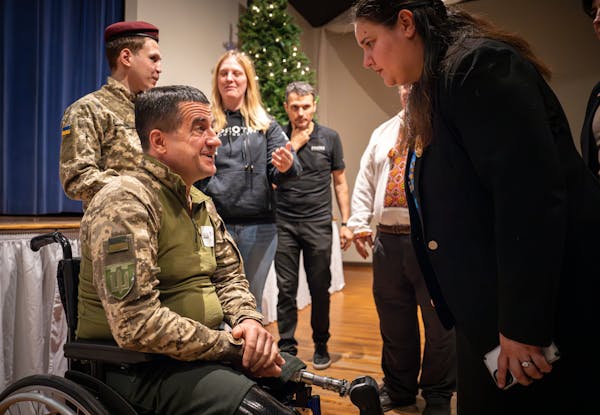Alex Hutsul is concerned as multibillion-dollar aid deals to Ukraine falter in Congress and the European Union. He arrived in Minnesota a month ago from Ukraine, and worries how his country will continue to fight the Russians.
"Without help, Ukraine is going to lose a lot," Hutsul said through an interpreter. "If they don't have help, if they don't have support, it's very hard to win."
He went to an event Friday at the Ukrainian American Community Center in Northeast Minneapolis, where community leaders discussed how they have helped Ukrainian refugees with food distributions, legal services, job fairs and other types of support, and asked for feedback on what more they could do.
But beyond the happy stories of Ukrainians aided locally, global headlines conveyed a grim reality of stalled funding for the battlefront. Hungary this week temporarily blocked a $54 billion aid package from the European Union, while Congress approaches the holidays without approving the $61 billion in aid sought by Ukrainian President Volodymyr Zelenskyy as Republicans demand that Democrats approve more U.S. border security in return.
"Voting for supplemental aid for Ukraine is not only protecting Ukraine, but it's also protecting American interests," said Luda Anastazievsky, chair of the Minnesota Ukrainian American Advocacy Committee.
She said the committee this week connected with constituents in seven of Minnesota's eight congressional districts about advocating for the bill. Anastazievsky said the funding to Ukraine has been used properly and that such aid also injects billions into American communities that make missiles and military equipment.
"We understand that helping Ukraine is expensive, obviously," she said. "But the cost of not helping it is much higher politically because, of course, if we are not helping Ukraine, what message are we sending to all the autocracies around the world?"
Sofiia Rudenko, who arrived a year ago from Ukraine, said many Ukrainian refugees locally send money to their relatives fighting in the war – money earned in U.S. dollars is worth a lot more back home.
As program director for the nonprofit American Service in Ukraine, she said Ukrainians hope that other countries continue to approve aid, but they understand "it's not going to be endless, the support."
"It's almost two years since the beginning [of the war] and people understand that it's huge money and the opportunities are limited, the capacity is limited," Rudenko said.
Maksym Brovko came to the Twin Cities from Ukraine just two weeks ago. He said through an interpreter that the people he knows back home tell him that "everything is hard and [there's] less help … a lot of help was before."
"A lot is frozen … people don't know what's going on and how it's going to be in the future. There is less hope in everything that they see," he said.
Dmytro Hupalo, a Ukrainian refugee who arrived in Minnesota this week from Poland, said through an interpreter that it's always better to have help. But he said he understands that Europe and the United States "have already done a lot for Ukraine."
"They gave a lot of weapons and everything. Even if they're going to stop doing it, we will understand they have their own concerns," he said.
Hupalo said that although the European Union this week agreed to open membership negotiations with Ukraine, Turkey has been in such talks for decades and still hasn't been admitted to the bloc. Still, he said, "It's a positive moment for Ukraine."

Want to share info with the Star Tribune? How to do it securely

'Safe recovery sites' would offer syringes, naloxone and more to people using drugs. The plan could be in peril.
New Minnesota GOP leaders seek peace with party's anti-establishment wing

Who is Republican Lisa Demuth, Minnesota's first House speaker of color?

